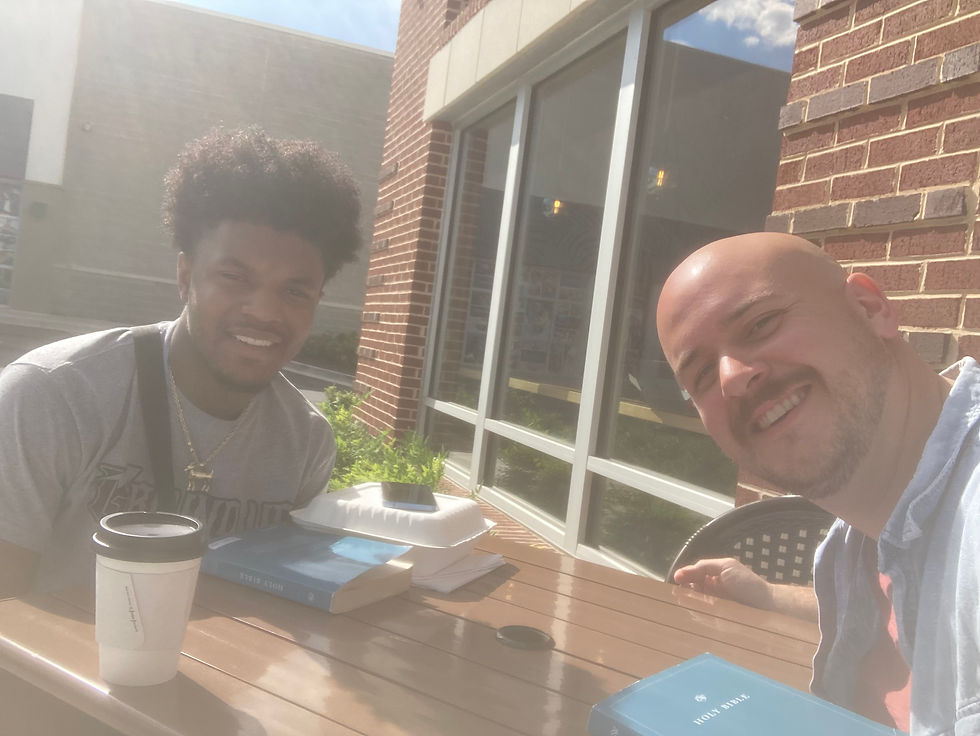
The Discovery Bible Study method (or DBS) is a discipleship model that’s being used by a growing movement of believers all over the world to intentionally make healthy disciples who obey Jesus’ commands, especially the command to “go and make disciples of all nations.” Our traditional church model is not producing disciples who are equipped and encouraged to “go,” and there are still thousands of people groups throughout the world that have yet to hear the good news of Jesus. So, if we’re going to be serious about the command Jesus gave us, we need some changes . . .
1. We need to be producing disciples who are seeking to know and obey Jesus’ Word.
2. We need a simple tool for developing these kinds of disciples.
3. We need this tool to be reproducible, meaning anyone can see the process and do it themselves, resulting in a rapidly growing number of groups. We want this, because the world needs Jesus. We must get out of our church bubbles and engage the lost!
The DBS is this simple, reproducible discipleship tool. This means every believer can and is encouraged to start a DBS, and it can be done in any setting–a coffee shop, a home, a workplace. It can also be done with believers to encourage obedience or with nonbelievers who are interested to know more about Jesus and how to begin following Him.
Our vision is to see one of these in every neighborhood in Chattanooga (and ultimately the world)!
I hope this post helps you see the “how” and some of the “whys” behind the Discovery Bible Study process and gives you the courage to start one yourself!
Here are the simple steps on how to lead a DBS . . .
Look Back
Care and Prayer
To start the meeting, have everyone share their “highs and lows” from the previous week (praises and prayer requests). Go around the circle and ask everyone to share something they’re thankful for this week as well as something that may be stressing them out that needs prayer. Then pray, thanking God for the praises and bringing the requests to Him. This is a time for everyone to lay their troubles down, support each other, and reset their minds on God’s goodness before the study begins. This prioritizes the DNA of love and worship in our groups.
Loving Accountability
At this point in the meeting, we follow up on goals from the previous week (you’ll see this when we get to the “Look Forward.”) You’ll remind each member what they committed to do the previous week and ask, “How did it go?” If this is your first day meeting, you can simply ask, “What did you do last week to obey Jesus?”
Remember that this is loving accountability, not guilting and judging. Be ready to show grace when needed (which is always). But don’t exclude this step because you’re afraid it will make people uncomfortable. It might take a little getting used to at first, but this DNA is vital to the health and growth of the disciple. Through this process, the disciple is learning to hear the voice of the Holy Spirit and follow His promptings, and this will result in a deeper, more vibrant personal walk with Jesus. It’s also proven that we learn better by putting new knowledge into practice. So, rejoice when people practiced what the Spirit laid on their hearts to do the previous week!
Vision Cast
Don’t skip the vision cast! This is the time of the meeting when you remind the group why we meet together every week: to produce disciples who make disciples, because Jesus desires to seek and save the lost through us as His witnesses.
Read one of the Great Commission passages: Matthew 28:18-20, Mark 16:15-16, Luke 24:46-48, Acts 1:8. A few other great passages are: Romans 10: 14-15 and Romans 1:16a.
Note: If you have members in your group who don’t know how to share the gospel, schedule a 411 training for one of your upcoming meeting times. Sharing Jesus is a very important part of their identity as a follower of Jesus, and we want to equip them with the tools to do that.

Look Up
Read Scripture
Here are some important rules:
-As the leader, you’re just facilitating the discussion, not teaching. No bullet points or line-by-line explanations of each verse. Don’t do all the talking, even if you know stuff about the passage that your group isn’t seeing. The reason for this is so that the disciple is allowed to “discover” what the Word says for themselves with the assistance of the Holy Spirit. This is why it’s called a “discovery” Bible study. It’s a proven fact that we will grasp and apply new knowledge better when we discover it ourselves. We can trust the Word of God and His Spirit to reveal what the disciple needs at that point in their spiritual walk.
-A DBS needs to stay focused on the passage at hand. You don’t want people to bring in thoughts from other verses and passages right now. If the discussion gets off topic, ask the question: “What verse did you see that from in this passage?” and encourage the discussion to focus on the story.
-You can do a DBS with any passage of scripture, but the process works best with stories, and there are some specific sets of stories that have already been created that you’re encouraged to start with, depending on your group. If you’re meeting with nonbelievers, you can start with Stories of Hope, and if you’re meeting with a new believer, start with the Commands of Christ. Find those story sets here.
Here’s the process:
Read and reread
Choose someone to read the story. Then, have someone else read it again in a different version.
Retell in your own words
Choose someone to narrate the story in their own words from memory (without peeking!) This serves a very important function, and the purpose is NOT to test their comprehension or memory of every detail. Encourage them that they probably won’t remember every detail, and that’s okay. But when someone tells back what they remember from the story from memory, their brains absorb and process so much more, they can begin to truly know and “own” the story personally, and it gives them practice to be able to share God's Word with others outside the group and even start their own group. Instead of choosing one person to narrate, you can also pair up with partners or have everyone chime in as a main group what they remember.
Ask Questions for Discussion
After you’ve thoroughly read, reread, and retold the story, you’re ready to discuss three simple questions about the story:
“What does the story say about God?”
“What does the story say about man?”
“What does the story tell us to do?” (Further prompting: Is there a command to obey? A sin to avoid? A promise to believe? An example to follow?)
The last question will lead naturally into the third part of the meeting, Look Forward.
Look Forward
Goal Setting
This is when you personally apply what you just learned from the story. We are asking ourselves: “What would Jesus have us do as a result of our reading today?”
This is “obedience-based” discipleship, and it may sound radical if you believe the purpose of reading the Bible is just to gain more knowledge. But Jesus said clearly that the purpose of hearing His words was to put it into practice: “Why do you call me ‘Lord, Lord,’ and do not do what I say?” (Luke 6:46).
Of course, along the way, we preach the need for God’s grace and strength and the power of His life within us. We are never doing this alone in our own strength, but must abide in Him (John 15:4). But by setting goals, we’re practicing listening to Him and cooperating with the Holy Spirit, so that He can live out His life in and through us.
Here are some examples of the kind of goals we like to see:
-Sharing the gospel with someone.
-Starting another DBS group.
-Forgiving/reconciling with someone.
-Repentance of sin and changed behavior.
-Baptism.
-Showing Christ-like love to someone.
-Anything else the Lord lays on your heart.
Prayer
Spend time praying together in groups no larger than four people, and encourage each person to pray aloud for each other and the goals that were set.

You are Commissioned
This whole process should only take about 45 minutes to an hour, and most groups meet once a week. If you’ve never led a DBS before, I encourage you to gather some friends, family members, or a neighbor and just try it. You are called and commissioned! And remember that you will not be doing it alone, for Jesus promises to be with you:
“Then Jesus came to them and said, ‘All authority in heaven and on earth has been given to me. Therefore go and make disciples of all nations, baptizing them in the name of the Father and of the Son and of the Holy Spirit, and teaching them to obey everything I have commanded you. And surely I am with you always, to the very end of the age” (Matthew 28:18-20).
My prayer is that your Discovery Bible Study group will result in much gospel sharing and will multiply into many groups for the praise of His glory! Some groups also identify as simple churches, which is a topic for another post. God bless you and lead you, friends!
Comments